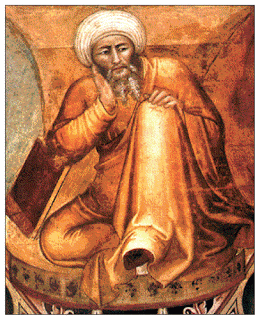(Note: Most of this is from the previous post "The Commentator" on 11 December 2012)
Averroes (1126-1198) was born in Córdoba into a family of distinguished jurists and scholars at a time when Islamic culture was flourishing in Spain. He probably would have spent his life as a judge if not for his mentor and friend, the physician Abu Bakr ibn Tufayl, who told him that he should write commentaries on the works of Aristotle. The problem seen by ibn Tufayl was that Aristotle was too obscure either because of the ambiguity of his own writing or the shortcomings of his translators.Averroes, whose real name was ʾAbū al-Walīd Muḥammad bin ʾAḥmad bin Rušd, embraced the task so thoroughly that, to the West, he became known as "The Commentator." His scholarship was embraced across cultures: Jacob Anatoli translated Averroes' Commentaries into Hebrew. Anatoli's colleague and friend Michael Scot translated some directly into Latin.
He analyzed and promoted most of Aristotle (and Plato's Republic) to the known world, as well as writing dozens of books of his own. So far as we know, he did not have access to original texts—there is no evidence that he knew Greek—and so his commentaries are based on Arabic translations of Aristotle.
He was a rationalist, he asserted that philosophy and religion were not in conflict because they taught about the same things. Common people needed religion and faith to understand what the intellectual could understand through reason and logic. He felt proper understanding of the Koran required analytical thinking.
Unfortunately for him, his rationalist views often got him into trouble when they came up against Islamic theology (which he had studied extensively). He was, in fact, banished by a caliph to whom he had been the personal physician, because some side remarks in Averroes' writing (such as "that Venus is one of the gods") struck the caliph as blasphemous. Fortunately, Averroes was allowed to return home prior to his death.
We've looked at a few different philosophers. Next I want to talk about a particular medieval school of philosophy: scholasticism.

No comments:
Post a Comment
Note: Only a member of this blog may post a comment.